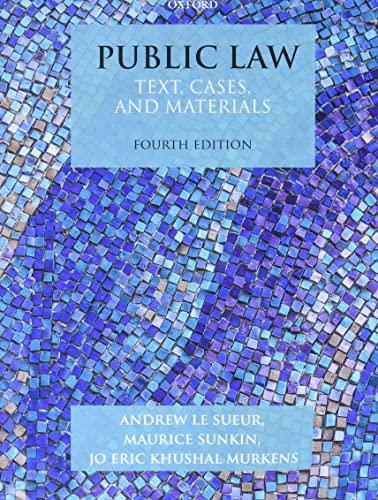Question
QUESTION: Part of this case revolved around the override provision (Sec. 33) of the Charter. Explain how this provision works. 3 marks In November 1980,
QUESTION:
- Part of this case revolved around the override provision (Sec. 33) of the Charter. Explain how this provision works. 3 marks
In November 1980, the respondent sought a declaration from the Superior Court that ss. 248 and 249 of the Consumer Protection Act, R.S.Q., c.P-40.1, which prohibited commercial advertising directed at persons under thirteen years of age, were ultra vires the Quebec legislature and, subsidiarily, that they infringed the Quebec Charter of Human Rights and Freedoms.The Superior Court dismissed the action.On appeal, the respondent also invoked the Canadian Charter of Rights and Freedoms which entered into force after the judgment of the Superior Court. The Court of Appeal allowed the appeal holding that the challenged provisions infringed s. 2(b) of the Canadian Charter and that the limit imposed on freedom of expression by ss. 248 and 249 was not justified under s. 1.This appeal is to determine (1) whether ss. 248 and 249 are ultra vires the Quebec legislature or rendered inoperative by conflict with s. 3 of Broadcasting Act, R.S.C. 1970, c. B-11 (You don't have to consider this question); (2) whether they are protected from the application of the Canadian Charter by a valid and subsisting override provision; (3) whether they infringe s. 2(b) of the Canadian Charter and s. 3 of the Quebec Charter; and if so, (4) whether the limit imposed by ss. 248 and 249 is justifiable under s. 1 of the Canadian Charter and s. 9.1 of the Quebec Charter; and (5) whether they infringed s. 7 of the Canadian Charter.
Held (Beetz and McIntyre JJ. dissenting):The appeal should be allowed.
(1)Sections 248 and 249 of the Consumer Protection Act are not ultra vires the provincial legislature nor deprived of effect under s. 3 of the Broadcasting Act.
(2)The override provision in s. 364 of the Consumer Protection Act expired on June 23, 1987.
(3)Sections 248 and 249 infringe s. 2(b) of the Canadian Charter and s. 3 of the Quebec Charter.
(4)Per Dickson C.J. and Lamer and Wilson JJ. (Beetz and McIntyre JJ. dissenting):Section 248 and 249 are justified under s. 1 of the Canadian Charter and s. 9.1 of the Quebec Charter.
(5)Section 7 of the Canadian Charter cannot be invoked by the respondent.
(1)Constitution Act, 1867
In this part of the judgment the court ruled the Quebec government had the constitutional authority to enact the legislation that is being challenged. In other words, the legislation is intra vires the jurisdiction of Quebec. But that still leave the Charter questions to be resolved.
(2)Application of Canadian Charter
For the reasons given in Ford v. Quebec (Attorney General), [1988] 2 S.C.R. 712, s. 364 of the Consumer Protection Act -- the standard override provision enacted by s. 1 of the Act respecting the Constitution Act, 1982, S.Q. 1982, c. 21 -- came into force on June 23, 1982 and ceased to have effect on June 23, 1987. Since s. 364 was not re-enacted pursuant to s. 33(4) of the Canadian Charter, it follows that ss. 248 and 249 of the Consumer Protection Act are no longer protected from the application of the Canadian Charter by a valid and subsisting override provision.
Step by Step Solution
There are 3 Steps involved in it
Step: 1

Get Instant Access to Expert-Tailored Solutions
See step-by-step solutions with expert insights and AI powered tools for academic success
Step: 2

Step: 3

Ace Your Homework with AI
Get the answers you need in no time with our AI-driven, step-by-step assistance
Get Started


